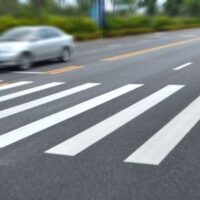Unscientific Study May Indicate Expensive Cars are Less Likely to Slow for Pedestrians

Cars do hit pedestrians, seemingly at random. Or is it so random? Could there be a correlation between the kind of car someone drives, and the likelihood that they will hit a pedestrian?
Study Looks at Who Slows Down
Someone wanted to find out, and they conducted a study to see if they could find a connection. The organizers found a bunch of people, who volunteered to cross streets legally, at designated crosswalks in Las Vegas, an area that has a good amount of pedestrian traffic.
As the pedestrians would cross, observers would look to see whether cars observed the pedestrians, or slowed down for the pedestrians, and looked to see what kind of vehicles were and were not slowing down. Observers gave an estimated value to the vehicles they observed, to see if the value of a car correlated with its likelihood to stop, observe, or slow down for the pedestrians.
Not the Best Study
Needless to say, this study is and was very subjective, as the observers had to determine when a car was observing pedestrians, and when it was not. Still, the study yielded interesting results.
Only about 1/3 of all cars actually stopped or slowed at all, to allow pedestrians to cross the street, which by itself is not a great statistic. By a very small margin, cars were more likely to slow and stop for females more so than males.
Value of the Vehicle
But there was one factor that did correlate highly with the likelihood that a car would stop for a pedestrian: the estimated value of the vehicle.
The more expensive the vehicle, the less likely it was to slow down for the pedestrians. For every $1,000 increase in the estimated value of the car, the likelihood that the car would slow down for pedestrians went down by about 3%.
Of course, other factors could have played into this less than scientific study. Drivers in other areas may have fared better than in Las Vegas. But the trend was consistent in that higher value cars did not yield to pedestrians as commonly as their lower valued counterparts.
Why Didn’t Expensive Cars Slow Down?
We have no idea of knowing why the study yielded the results that it did. Are people in more expensive cars, in more of a hurry? Or perhaps people in more expensive cars are more reliant on in-car pedestrian avoidance technology, and thus, less used to looking out for pedestrians? Maybe the more expensive cars simply drive faster, which leaves a driver less time to even observe the pedestrians in the first place?
We simply don’t know, and the study didn’t stop the cars, to see who was driving them, so we know nothing about the demographics of the people driving those cars.
Call to schedule a consultation with the Tampa personal injury lawyers at Barbas, Nunez, Sanders, Butler & Hovsepian today if you were injured by a car as a pedestrian. We understand the issues involved in pedestrian car accidents.
Sources:
caranddriver.com/news/a31131731/new-study-says-expensive-cars-are-bought-by-jerks-who-wont-yield/
sciencedirect.com/science/article/abs/pii/S2214140520300359
